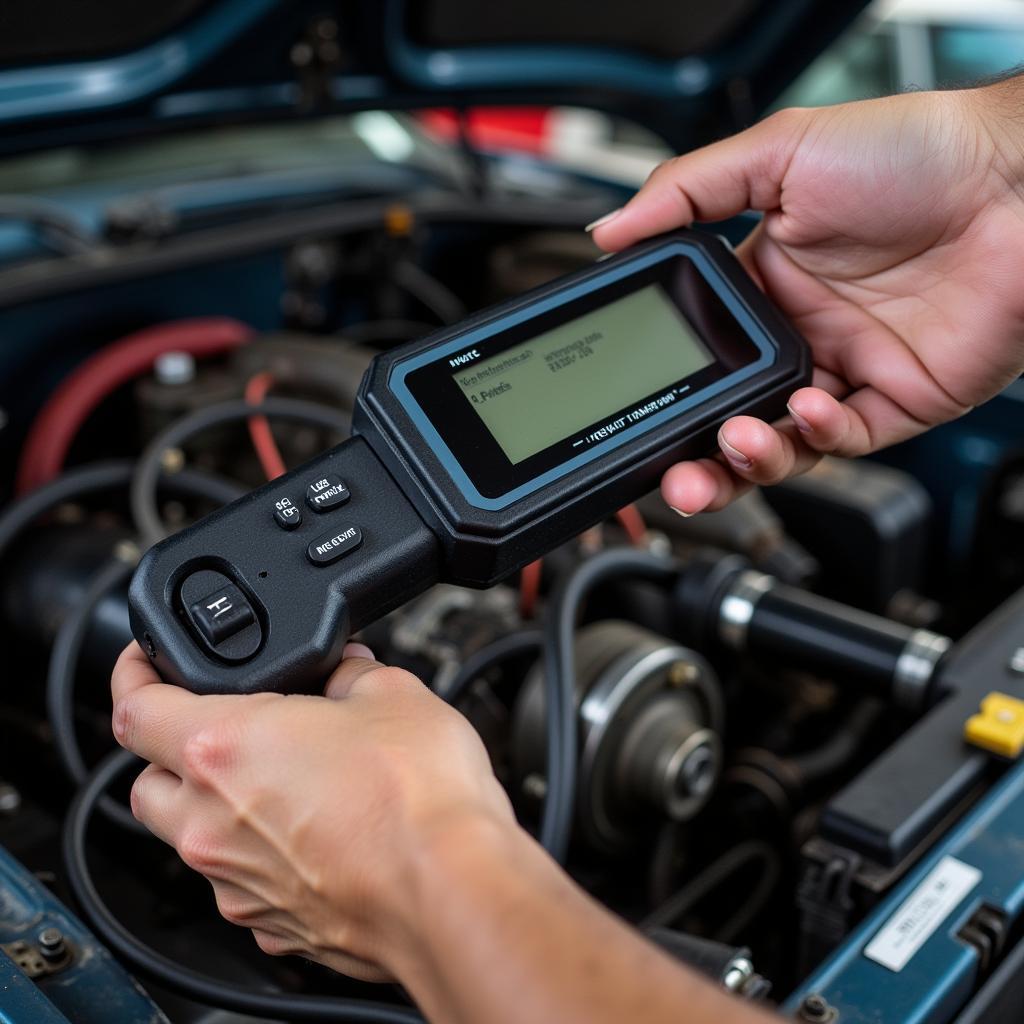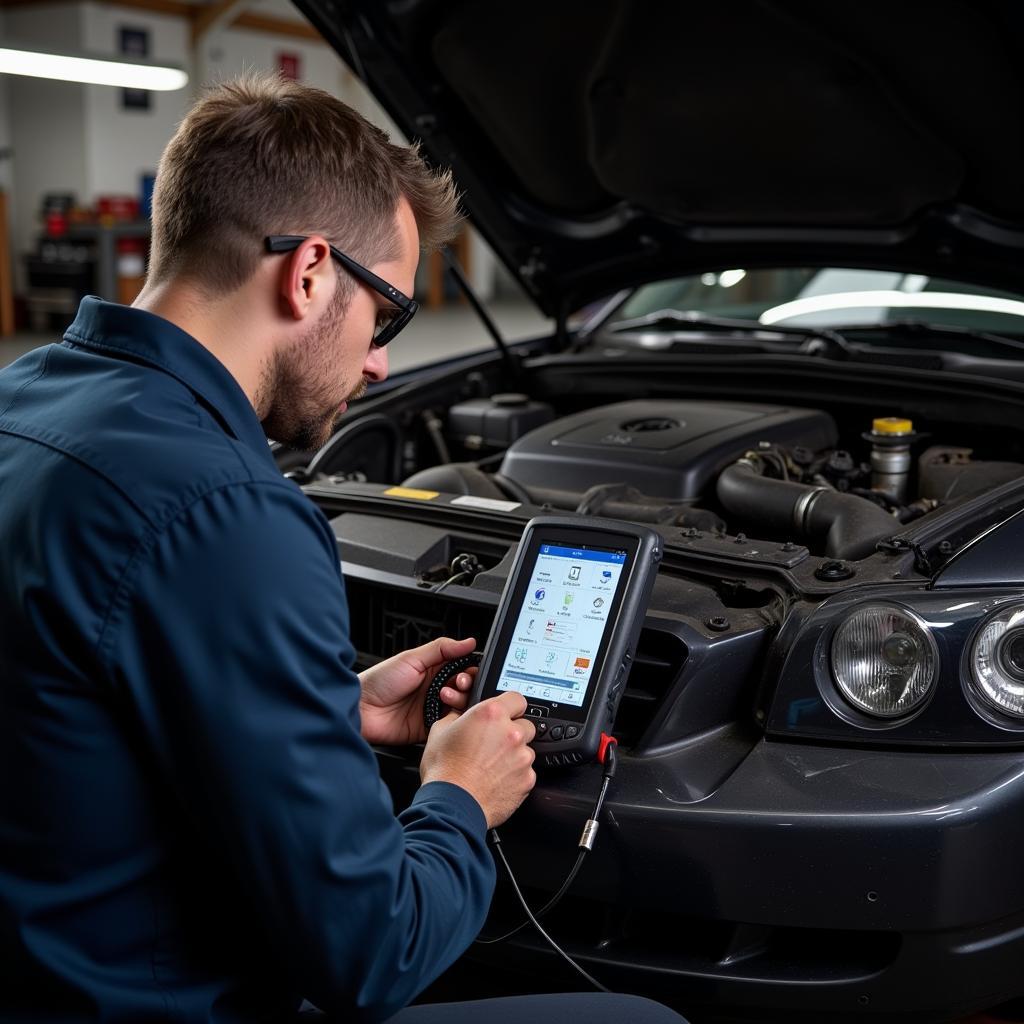Finding the best car diagnostic tool for older cars can be challenging. Unlike modern vehicles with standardized OBD-II ports and digital systems, classic cars often have unique quirks and require specialized tools for accurate diagnostics.
 Classic Car Engine Diagnostic
Classic Car Engine Diagnostic
Whether you’re a seasoned mechanic or a DIY enthusiast, having the right diagnostic tool can save you time, money, and frustration. This guide will explore the best car diagnostic tools for older cars, helping you choose the right one to keep your classic running smoothly.
Understanding the Challenges of Diagnosing Older Cars
Older cars, especially those manufactured before the widespread adoption of onboard diagnostics (OBD) in the mid-1980s, pose unique diagnostic challenges. Unlike modern vehicles with standardized OBD-II ports, older cars often have:
- Proprietary Diagnostic Connectors: Manufacturers used various connectors before OBD-II standardization, making finding the correct adapter crucial.
- Limited Electronic Components: Older cars rely heavily on mechanical systems, requiring different diagnostic approaches compared to modern, electronically-controlled vehicles.
- Scarcity of Information: Finding reliable repair manuals and diagnostic information for older cars can be difficult, emphasizing the importance of a versatile diagnostic tool.
Key Features to Look for in a Car Diagnostic Tool for Older Cars
When choosing a car diagnostic tool for older vehicles, consider these key features:
- Compatibility: Ensure the tool supports your car’s make, model, and year, including compatibility with pre-OBD systems.
- Connector Adapters: A wide range of connector adapters ensures you can establish a connection with your car’s diagnostic port.
- Deep System Coverage: Look for a tool that can read and clear codes for engine, transmission, ABS, airbags, and other critical systems.
- Live Data Stream: Real-time data display for various sensors helps pinpoint issues while the engine is running.
- Bi-Directional Control: This feature allows you to command specific components, like actuators and solenoids, for active testing.
- User-Friendly Interface: An intuitive interface with clear menus and easy navigation simplifies the diagnostic process.
Types of Car Diagnostic Tools for Older Cars
Several types of diagnostic tools cater to older vehicles:
1. Professional-Grade Scan Tools
These tools offer comprehensive coverage and advanced features, making them ideal for professional mechanics.
- Pros: Extensive vehicle coverage, deep system access, bi-directional control, live data, and specialized functions.
- Cons: High cost, complex functionality may require training.
 Mechanic Using a Professional Scan Tool on a Classic Car
Mechanic Using a Professional Scan Tool on a Classic Car
2. DIY-Friendly Code Readers
Code readers are more affordable and user-friendly, focusing on reading and clearing diagnostic trouble codes (DTCs).
- Pros: Affordable, easy to use, suitable for basic diagnostics and code clearing.
- Cons: Limited functionality, may not support all car makes and models.
3. Manufacturer-Specific Tools
Some manufacturers offer specialized diagnostic tools designed for their vehicles.
- Pros: In-depth coverage for a specific car brand, access to proprietary systems and information.
- Cons: Limited use for other car makes, can be expensive.
Tips for Diagnosing Older Cars
- Consult Repair Manuals: Factory repair manuals provide invaluable information on diagnostic procedures and system specifications.
- Check for Vacuum Leaks: Older cars often rely heavily on vacuum systems, and leaks can cause various performance issues.
- Inspect Ground Connections: Ensure all ground connections are clean and tight, as poor grounding can lead to electrical gremlins.
- Start with the Basics: Rule out simple issues like spark plugs, fuel filters, and air filters before diving into complex diagnostics.
Conclusion
Choosing the best car diagnostic tool for older cars involves understanding your specific needs, budget, and the complexities of your vehicle. By prioritizing compatibility, functionality, and ease of use, you can find the perfect tool to keep your classic car running smoothly for years to come.
FAQs
1. Can I use a modern OBD-II scanner on my older car?
Modern OBD-II scanners will only work on vehicles manufactured after 1996. For older cars, you’ll need a tool compatible with pre-OBD systems or appropriate adapters.
2. Are there any free car diagnostic tools available?
While some smartphone apps offer basic diagnostic functionality, their capabilities are limited. Investing in a dedicated diagnostic tool is recommended for reliable and comprehensive results.
3. Do I need a professional-grade scanner for DIY diagnostics?
For basic diagnostics and code clearing, a DIY-friendly code reader can be sufficient. However, if you plan to delve deeper into system analysis and troubleshooting, a more advanced scanner might be necessary.
4. How often should I diagnose my older car?
It’s recommended to perform a diagnostic scan at least once a year or whenever you experience unusual performance issues.
5. Can a car diagnostic tool fix problems?
Diagnostic tools primarily identify problems, not fix them. They help pinpoint the root cause of issues, allowing you to perform the necessary repairs or seek professional help.
Need further assistance in choosing the best car diagnostic tool for your older car? Contact our expert team via WhatsApp: +1(641)206-8880 or Email: [email protected]. We offer 24/7 support to help you find the perfect diagnostic solution for your needs.

Leave a Reply